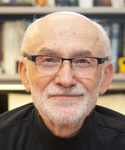Electronics and Photonics Division Award
Let There be Light… – Research at the Intersection of Electronics and Photonics
By Andrew Steckl
Andrew Steckl is Ohio Eminent Scholar, Gieringer Professor, and Distinguished University Research Professor at the University of Cincinnati, US, in the Departments of Electrical Engineering and Computer Science, and Materials Science and Engineering. Steckl obtained his BS from Princeton University, US, and his MS and PhD from University of Rochester, US. He is a Life Fellow of the Institute of Electrical and Electronic Engineering (IEEE), Fellow of the National Academy of Inventors, and Fellow of American Association for the Advancement of Science (AAAS) “For Distinguished Contributions to Optoelectronics.”
After several years in industrial R&D, Steckl joined Rensselaer Polytechnic Institute, US, in 1976 as a faculty member in the Electrical & Computer Engineering Department, where he founded the Center for Integrated Electronics, a multi-disciplinary campus-wide activity. At the University of Cincinnati since 1988, Steckl’s current research activities are in (1) biosensors; (2) microfluidic lab-on-chip devices; and (3) electrospinning of complex nanofibers and related membrane chem/bio/med applications. To date, Steckl has graduated 47 PhD students and supervised 13 postdoctoral fellows. With his students, he published ~ 440 papers which received over 13,000 citations to date. This resulted in a current citation H index of 61. Steckl obtained 26 patents on various electronic materials and devices.
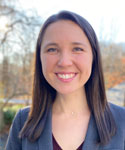 Energy Technology Division Graduate Student Award sponsored by Bio-Logic
Energy Technology Division Graduate Student Award sponsored by Bio-Logic
Understanding Charge Transport for Current and Future Electrochemical Energy Storage Technologies
By Lisa Housel
Lisa M. Housel is currently a fifth-year PhD candidate in Chemistry at Stony Brook University, US, under the mentorship of Dr. Esther S. Takeuchi, Dr. Kenneth J. Takeuchi, and Dr. Amy C. Marschilok. She received her BS in Chemistry and Economics at Muhlenberg College, US. Housel’s graduate research aims to understand the impact of charge transport properties on the structural change and electrochemistry of different battery materials. Specifically, synchrotron-based operando methods enabled Housel to probe structural and chemical changes of battery materials during electrochemical reduction and oxidation. Housel’s graduate work resulted in over 20 publications including multiple publications in the Journal of The Electrochemical Society.
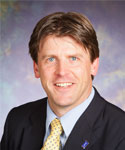 Energy Technology Division Research Award
Energy Technology Division Research Award
Electrochemical CO2 Reduction: Path Towards a Carbon Neutral Chemical Industry?
By Paul J.A. Kenis
Paul J.A. Kenis is the Elio E. Tarika Endowed Chair and Professor of Chemical and Biomolecular Engineering at the University of Illinois at Urbana-Champaign (UIUC), US, and an investigator of the International Institute for Carbon-Neutral Energy Research between Kyushu University, Japan, and UIUC.
Kenis, a native of the Netherlands, received his BS degree in Chemistry from Nijmegen Radboud University, Netherlands, where he worked on model systems for metalloproteins with Roeland Nolte, and his PhD degree in chemical engineering at the University of Twente, Netherlands, working with David Reinhoudt on films for nonlinear optical applications. As a postdoc with George Whitesides at Harvard University, US, he explored the then-emerging area of microfluidics.
At UIUC, Kenis develops microchemical systems with a range of applications: fuel cells, radiolabeling of biomolecules, protein/pharmaceutical crystallization, and platforms for cell biology studies. His recent efforts on CO2 electroreduction pursue suitable catalysts, electrodes, electrolyzer designs, determining suitable operation conditions, and performing techno-economic analysis as a guide towards more energy efficient systems.
Kenis authored over 200 publications and 14 patents. He was elected a Fellow of The Electrochemical Society in 2019, and previously recognized with a 3M Young Faculty Award, NSF CAREER award, Xerox award, and Best Paper Awards from AIChE and the Society for Experimental Biology and Medicine. He is also coauthor of reports on the prospects of CO2 utilization at scale issued by the National Academies and the Mission Innovation global consortium.
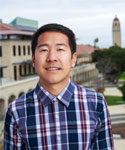 Energy Technology Division Supramaniam Srinivasan Young Investigator Award
Energy Technology Division Supramaniam Srinivasan Young Investigator Award
Using Mechanistic Understanding of Electrocatalytic CO2 and CO Reduction to Guide Catalyst Discovery
By Christopher Hahn
Christopher Hahn completed his PhD in Chemistry at the University of California, Berkeley, US, in 2012, where he studied bandgap engineering of 1-dimensional nitride and oxynitride materials for solar water splitting. After receiving his PhD, he conducted his postdoctoral research on catalyst discovery for electrochemical CO2 reduction at Stanford University, US, in the SUNCAT Center for Interface Science and Catalysis. He began his current position as Associate Staff Scientist at SLAC National Accelerator Laboratory in 2015, where he conducts research at the intersection of the fields of heterogeneous catalysis and organic electrosynthesis.
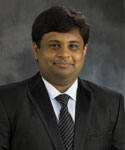 Industrial Electrochemistry and Electrochemical Engineering Division Student Achievement Award
Industrial Electrochemistry and Electrochemical Engineering Division Student Achievement Award
System-Level Approaches for Intensifying the CO2 Electrolysis Process
By Saket Bhargava
Saket Bhargava received his BE with Honors in Chemical Engineering from the Birla Institute of Technology & Science–Pilani, India, in May 2015. After completing undergraduate studies, he worked for two years at Royal Dutch Shell’s India Technology Center as a process technologist for propylene oxide derivatives. In the fall of 2017, Bhargava started graduate studies at the University of Illinois at Urbana-Champaign, US, and joined Prof. Kenis’ research group. Bhargava works on using flow electrolyzers to develop system-level process intensification approaches, and studies the effects of intensified process conditions on the activity, selectivity, and energy efficiency for CO2 electroreduction to value-added chemicals.
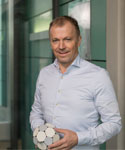 Nanocarbons Division Robert C. Haddon Research Award
Nanocarbons Division Robert C. Haddon Research Award
Chemical Functionalization of Synthetic Carbon Allotropes
By Andreas Hirsch
Andreas Hirsch received his PhD in 1990 from the Eberhard Karls Universität Tübingen, Germany. From 1990 to 1991 he was a Postdoctoral Fellow in Prof. Wudl’s group at the Center for Polymers and Organic Solids (CPOS), University of California, Santa Barbara, US. He then returned to Tübingen as Research Associate at the Institute for Organic Chemistry. Hirsch received his Dr. Habilitus in 1994 with various prizes and awards. He was then appointed Professor of Organic Chemistry at the Karlsruhe Universität, Germany. Since October 1995, he has been Full Professor of Organic Chemistry at the Friedrich-Alexander-Universität Erlangen-Nürnberg, Germany. There he coordinates the Graduate School of Molecular Science (GSMS), Interdisciplinary Center for Molecular Materials (ICMM), and Collaborative Research Center “Synthetic Carbon Allotropes” (SFB 953). Hirsch received the Elhuyar-Goldschmidt-Prize of the Spanish and German Chemical Societies (2006), ERC Advanced Grant (2010 and 2017), and was elected a member of the Bayerische Akademie der Wissenschaften (2017). Hirsch’s laboratory pioneered and is at the forefront of carbon allotrope chemistry. It is well known for the investigation of basic principles for the functionalization of 0-dimensional fullerenes, 1-dimensional carbon nanotubes, and 2-dimensional graphene, which lead to the synthesis of numerous examples of derivatives with tailor-made structural, electronic, photophysical, and biomedical properties. These studies also extend to new 2D-materials including black phosphorus and transition metal dichalcogenides.
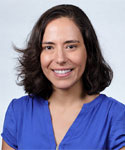 Nanocarbons Division SES Young Investigator Award
Nanocarbons Division SES Young Investigator Award
Nanomaterials Engineering to Probe and Control Living Systems
By Markita Landry
Markita Landry is Assistant Professor in the Department of Chemical and Biomolecular Engineering at the University of California, Berkeley, US. She received a BS in Chemistry and BA in Physics from the University of North Carolina at Chapel Hill, US; and a PhD in Chemical Physics and Certificate in Business Administration from the University of Illinois at Urbana-Champaign. Landry completed an NSF Postdoctoral Fellowship in Chemical Engineering at the Massachusetts Institute of Technology, US.
Her current research centers on the development of synthetic nanoparticle-polymer conjugates for imaging neuromodulation in the brain, and for the delivery of genetic materials into plants for plant biotechnology applications. The Landry Lab exploits the highly tunable chemical and physical properties of nanomaterials for the creation of bio-mimetic structures, molecular imaging, and plant genome editing. She is on the Scientific Advisory Board of Terramera, Inc. Landry recently received early career awards from the Brain and Behavior Research Foundation, Burroughs Wellcome Fund, Parkinson’s Disease Foundation, DARPA Young Investigator Program, Beckman Young Investigator Program, and Howard Hughes Medical Institute. She is a Sloan Research Fellow, FFAR New Innovator, and Chan-Zuckerberg Biohub Investigator.
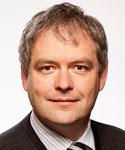 Organic and Biological Electrochemistry Division Manuel M. Baizer Award
Organic and Biological Electrochemistry Division Manuel M. Baizer Award
Making Electroorganic Synthesis More Practical
By Siegfried R. Waldvogel
Siegfried R. Waldvogel received the 2020 ECS Organic and Biological Electrochemistry Division Manuel M. Baizer Award in recognition of his significant contributions to the field of organic electrochemistry. A symposium and reception in his honor was scheduled for the (canceled) 237th ECS Meeting with IMCS 2020 in Montréal, Canada.
Waldvogel holds a PhD from the Max-Planck-Institut für Kohlenforschung at the Ruhr Universität Bochum, Germany. A professor at the Gutenberg-Universität Mainz, Germany, he was recently named Director of the Gutenberg Forschungskolleg. His research focuses on organic electrochemistry, oxidative coupling reactions with MoV-reagents, and supramolecular sensing. He produced almost 220 publications and patents on anodic and cathodic transformations. An ECS member, Waldvogel has presented seminars at ECS meetings and published in ECS journals.





